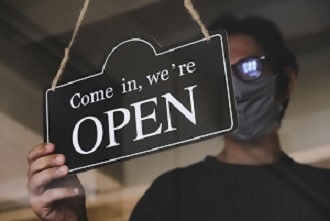Guest post by Mark Heppell, Corporate Partner at JMW Solicitors
 As the government has now announced the roadmap out of the coronavirus pandemic, it’s time to reflect over this unprecedented and unpredictable time. Despite decreased demand and difficult challenges to overcome, businesses have remained resilient during the global pandemic.
As the government has now announced the roadmap out of the coronavirus pandemic, it’s time to reflect over this unprecedented and unpredictable time. Despite decreased demand and difficult challenges to overcome, businesses have remained resilient during the global pandemic.
The business legal experts at JMW Solicitors reached out to UK businesses that have seen success during the pandemic and new business owners that have taken the downtime as the opportunity to launch their own companies. Here, we take a look at the lessons that they learned from the pandemic that can be adapted to help other businesses succeed as we come out of the other side.
1. Streamline processes
Husband and wife team Will and Gill Sherwin from online beer retailer Best of British Beer saw orders increase seven-fold during lockdown and had to quickly adapt.
Gill said: “We streamlined the order fulfilment process, removing products and processes that were resource hungry. To increase capacity and space for people to work in, we installed a mezzanine floor and outside storage facilities. We also extended our operational hours, which allowed us to safely increase our team to meet demand.
“All of the measures that have been introduced will probably remain as they are good working practices. Our volumes were four times higher than normal when the first lockdown ended and people were able to go to the pub, so streamlining processes and being a bit more ruthless about products that aren’t earning their place is a good ongoing thing to do.”
2. Adapt to survive
One of the most heavily hit industries during the coronavirus pandemic has been the hospitality industry, with pubs, restaurants and hotels closed for some time. However, some businesses have managed to adapt their offering to cater to life in lockdown by providing delivery and takeaway services. This resulted in a demand for catering supplies and equipment.
we paid over and above our credit terms in order to secure stock as this gave us a massive advantage within the market
A spokesperson from Catering24, a distributor of catering disposables, cleaning and janitorial products, discussed how it’s a better company now because of the operation they put in place and how they have adapted their service.
They said: “We have, in our estimation, leapt forward three years in terms of our operational efficiency and the way we work with our customers.”
Predominantly working as a catering supplier to multiple industries, the company saw a huge swathe of their customer base impacted right at the beginning of the COVID-19 pandemic when many of them were forced to close their doors.
Products that were regularly supplied, particularly to schools and universities, immediately stopped overnight. However, in other sectors, customers and businesses were adapting to what was happening. Businesses began to shift towards a takeaway offering and while Catering24’s range for that was already healthy, it also shifted in order to heavily increase its volume in anticipation of that.
A spokesperson said: “It felt risky at the time, given the reactive nature of how decisions were being made with COVID-19, but we managed to pull it off. We analysed the type of enquiries we were receiving and we made a judgement based on the information we had.”
3. Relationships are key
Gill from Best of British Beer explains how relationships with both suppliers and customers was key during the pandemic, she said: “We couldn’t have coped with the increased volume without the strong supplier base and flexible workforce that we have. We were able to call people in and our suppliers were just fantastic at supporting us with urgent requests that were way above forecast”.
This was echoed by Catering24: “It was important that we maintained a really good relationship with manufacturers and we paid over and above our credit terms in order to secure stock as this gave us a massive advantage within the market.”
4. Stay visible
While it may be tempting to throw in the towel when times are difficult, it’s important to not go dark. “Keep visible, keep talking to people, stay on social media” is the advice from Best of British Beer’s Gill, who went on to say: “I can’t imagine how awful it must be for most people in hospitality – we know we were lucky. We wouldn’t be in this position if online retailers were also forced to close.
“We made a conscious decision to be a lifeline for some small breweries that had no other outlet and asked us to keep buying from them. We did and they’ve survived. So reach out to your community, sell vouchers, sell the future.”
We strived to make it more efficient, started working with multiple couriers, rather than just one, and also shifted to offering delivery six days a week, rather than five
Ben and Alice who set up coffee subscription service RISE during the pandemic said: “If you believe in your business, you just have to keep working hard at it and explore every avenue until you find what works for you. We have played with designs, products, marketing channels, etc. and still try to optimise all the time. Hang in there!”
For many businesses that operated from physical premises, staying visible meant going online. David Cant who set up Smart Screen, a revolutionary, high-end quality cleaning cloth for phones, tablets or other smart devices, during the pandemic said: “We needed to constantly change our expectations of how the product would be marketed. With no retail open and no-one commuting on trains and no travel for the foreseeable future we needed to access people at home and needed to take our business fully online. This meant the need for a slick website and turning to blogs and press to help keep us seen.”
5. Introduce flexibility
Due to how reactive the situation was, businesses found that they were having to introduce/improve flexibility within their operation. Catering24 experienced customers wanting to order on an ad-hoc basis, order online, purchase as late as possible, not be restricted by a limited order value, and still be able to receive the supplies the very next day.
Their spokesperson said: “This was something we were doing before the pandemic, but we’ve elevated it over the last 12 months. We strived to make it more efficient, started working with multiple couriers, rather than just one, and also shifted to offering delivery six days a week, rather than five.”
Many employees were told to work from home – something which was increasingly becoming commonplace prior to the pandemic – and many businesses are planning to keep remote working as part of their organisation.
Kevin Rowe from SafetyBuyer, a one-stop-shop for health and safety products said: “We were able to adopt a combination of remote working and changes in the workplace to ensure all staff had the confidence to return to work and remain productive and motivated.
“Some of the opportunities for working from home can be maintained to give some greater flexibility, as well as workplace hygiene routines. These simple, low-cost measures could help keep seasonal bugs and infections at lower levels too and don’t add any burden to the business.”
There’s no doubt about it that as a nation, we have faced a truly difficult and uncertain time over the last year and it would be a terrible mistake to not review the last year to learn lessons not only for the next pandemic, but for the future success of your business. We hope these positive outcomes can inspire and guide other businesses not just throughout the remaining restrictions, but also generally in the future.
More on JMW Solicitors


